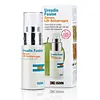What's inside
What's inside
 Key Ingredients
Key Ingredients

 Benefits
Benefits

 Concerns
Concerns

 Ingredients Side-by-side
Ingredients Side-by-side

Water
Skin ConditioningOctocrylene
UV AbsorberEthylhexyl Salicylate
UV AbsorberPropanediol
SolventButyl Methoxydibenzoylmethane
UV AbsorberPolymethyl Methacrylate
Dimethicone
EmollientPhenylbenzimidazole Sulfonic Acid
UV AbsorberPolysilicone-15
UV FilterPropylene Glycol Dicaprylate/Dicaprate
EmollientTromethamine
BufferingBis-Ethylhexyloxyphenol Methoxyphenyl Triazine
Skin ConditioningSilica
AbrasiveDimethicone/Vinyl Dimethicone Crosspolymer
Skin Conditioning1,2-Hexanediol
Skin ConditioningPolysorbate 60
EmulsifyingPEG-10 Dimethicone
Skin ConditioningSodium Hyaluronate
HumectantTocopheryl Acetate
AntioxidantXanthan Gum
EmulsifyingCaprylyl Glycol
EmollientParfum
MaskingDisodium EDTA
PEG-8
HumectantTocopherol
AntioxidantTropolone
Skin ConditioningAscorbyl Palmitate
AntioxidantAscorbic Acid
AntioxidantCitric Acid
BufferingWater, Octocrylene, Ethylhexyl Salicylate, Propanediol, Butyl Methoxydibenzoylmethane, Polymethyl Methacrylate, Dimethicone, Phenylbenzimidazole Sulfonic Acid, Polysilicone-15, Propylene Glycol Dicaprylate/Dicaprate, Tromethamine, Bis-Ethylhexyloxyphenol Methoxyphenyl Triazine, Silica, Dimethicone/Vinyl Dimethicone Crosspolymer, 1,2-Hexanediol, Polysorbate 60, PEG-10 Dimethicone, Sodium Hyaluronate, Tocopheryl Acetate, Xanthan Gum, Caprylyl Glycol, Parfum, Disodium EDTA, PEG-8, Tocopherol, Tropolone, Ascorbyl Palmitate, Ascorbic Acid, Citric Acid
Water
Skin ConditioningCyclopentasiloxane
EmollientDimethicone
EmollientXylitol
HumectantGlycerin
HumectantCreatine
Skin ConditioningGlycine
BufferingUrea
BufferingPhenoxyethanol
PreservativeDimethiconol
EmollientPolyacrylamide
Sclerotium Gum
Emulsion StabilisingMalus Domestica Fruit Cell Culture Extract
Skin ConditioningAcrylates/C10-30 Alkyl Acrylate Crosspolymer
Emulsion StabilisingC13-14 Isoparaffin
EmollientEthylhexylglycerin
Skin ConditioningHydrolyzed Hyaluronic Acid
HumectantSodium Hyaluronate
HumectantTocopheryl Acetate
AntioxidantParfum
MaskingLaureth-7
EmulsifyingHydroxypropyl Cyclodextrin
MaskingSodium Hydroxide
BufferingUbiquinone
AntioxidantXanthan Gum
EmulsifyingLimonene
PerfumingHexyl Cinnamal
PerfumingLecithin
EmollientCoumarin
PerfumingCitral
PerfumingLinalool
PerfumingPalmitoyl Tripeptide-38
Skin ConditioningWater, Cyclopentasiloxane, Dimethicone, Xylitol, Glycerin, Creatine, Glycine, Urea, Phenoxyethanol, Dimethiconol, Polyacrylamide, Sclerotium Gum, Malus Domestica Fruit Cell Culture Extract, Acrylates/C10-30 Alkyl Acrylate Crosspolymer, C13-14 Isoparaffin, Ethylhexylglycerin, Hydrolyzed Hyaluronic Acid, Sodium Hyaluronate, Tocopheryl Acetate, Parfum, Laureth-7, Hydroxypropyl Cyclodextrin, Sodium Hydroxide, Ubiquinone, Xanthan Gum, Limonene, Hexyl Cinnamal, Lecithin, Coumarin, Citral, Linalool, Palmitoyl Tripeptide-38
 Reviews
Reviews

Ingredients Explained
These ingredients are found in both products.
Ingredients higher up in an ingredient list are typically present in a larger amount.
Dimethicone is a type of synthetic silicone created from natural materials such as quartz.
What it does:
Dimethicone comes in different viscosities:
Depending on the viscosity, dimethicone has different properties.
Ingredients lists don't always show which type is used, so we recommend reaching out to the brand if you have questions about the viscosity.
This ingredient is unlikely to cause irritation because it does not get absorbed into skin. However, people with silicone allergies should be careful about using this ingredient.
Note: Dimethicone may contribute to pilling. This is because it is not oil or water soluble, so pilling may occur when layered with products. When mixed with heavy oils in a formula, the outcome is also quite greasy.
Learn more about DimethiconeParfum is a catch-all term for an ingredient or more that is used to give a scent to products.
Also called "fragrance", this ingredient can be a blend of hundreds of chemicals or plant oils. This means every product with "fragrance" or "parfum" in the ingredients list is a different mixture.
For instance, Habanolide is a proprietary trade name for a specific aroma chemical. When used as a fragrance ingredient in cosmetics, most aroma chemicals fall under the broad labeling category of “FRAGRANCE” or “PARFUM” according to EU and US regulations.
The term 'parfum' or 'fragrance' is not regulated in many countries. In many cases, it is up to the brand to define this term.
For instance, many brands choose to label themselves as "fragrance-free" because they are not using synthetic fragrances. However, their products may still contain ingredients such as essential oils that are considered a fragrance by INCI standards.
One example is Calendula flower extract. Calendula is an essential oil that still imparts a scent or 'fragrance'.
Depending on the blend, the ingredients in the mixture can cause allergies and sensitivities on the skin. Some ingredients that are known EU allergens include linalool and citronellol.
Parfum can also be used to mask or cover an unpleasant scent.
The bottom line is: not all fragrances/parfum/ingredients are created equally. If you are worried about fragrances, we recommend taking a closer look at an ingredient. And of course, we always recommend speaking with a professional.
Learn more about ParfumSodium Hyaluronate is hyaluronic acid's salt form. It is commonly derived from the sodium salt of hyaluronic acid.
Like hyaluronic acid, it is great at holding water and acts as a humectant. This makes it a great skin hydrating ingredient.
Sodium Hyaluronate is naturally occurring in our bodies and is mostly found in eye fluid and joints.
These are some other common types of Hyaluronic Acid:
Learn more about Sodium HyaluronateTocopheryl Acetate is AKA Vitamin E. It is an antioxidant and protects your skin from free radicals. Free radicals damage the skin by breaking down collagen.
One study found using Tocopheryl Acetate with Vitamin C decreased the number of sunburned cells.
Tocopheryl Acetate is commonly found in both skincare and dietary supplements.
Learn more about Tocopheryl AcetateWater. It's the most common cosmetic ingredient of all. You'll usually see it at the top of ingredient lists, meaning that it makes up the largest part of the product.
So why is it so popular? Water most often acts as a solvent - this means that it helps dissolve other ingredients into the formulation.
You'll also recognize water as that liquid we all need to stay alive. If you see this, drink a glass of water. Stay hydrated!
Learn more about WaterXanthan gum is used as a stabilizer and thickener within cosmetic products. It helps give products a sticky, thick feeling - preventing them from being too runny.
On the technical side of things, xanthan gum is a polysaccharide - a combination consisting of multiple sugar molecules bonded together.
Xanthan gum is a pretty common and great ingredient. It is a natural, non-toxic, non-irritating ingredient that is also commonly used in food products.
Learn more about Xanthan Gum